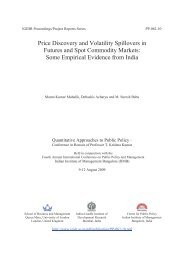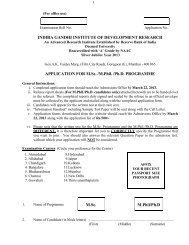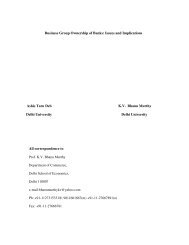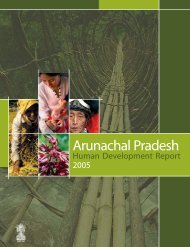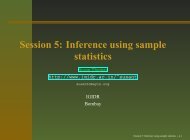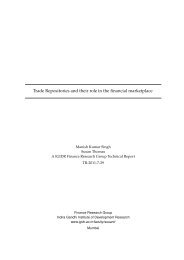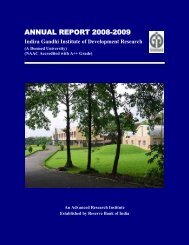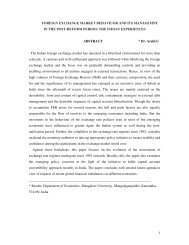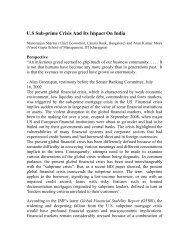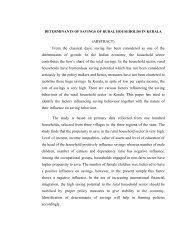Report of the Expert Group on Agricultural Indebtedness
Report of the Expert Group on Agricultural Indebtedness
Report of the Expert Group on Agricultural Indebtedness
Create successful ePaper yourself
Turn your PDF publications into a flip-book with our unique Google optimized e-Paper software.
<str<strong>on</strong>g>Expert</str<strong>on</strong>g> <str<strong>on</strong>g>Group</str<strong>on</strong>g> <strong>on</strong> <strong>Agricultural</strong> <strong>Indebtedness</strong>distress. It also recommends c<strong>on</strong>tinuati<strong>on</strong> <str<strong>on</strong>g>of</str<strong>on</strong>g> ‘N<strong>on</strong>-Credit Comp<strong>on</strong>ent’ <str<strong>on</strong>g>of</str<strong>on</strong>g> <str<strong>on</strong>g>the</str<strong>on</strong>g> package for twomore years (paras 4.36-4.38).Rescheduling <str<strong>on</strong>g>of</str<strong>on</strong>g> Loans <str<strong>on</strong>g>of</str<strong>on</strong>g> Farmers Affected by Natural Calamities12. The central and state governments have programmes <str<strong>on</strong>g>of</str<strong>on</strong>g> rescheduling loans to farmersaffected by natural calamities like floods and cycl<strong>on</strong>es with a view to reviving <str<strong>on</strong>g>the</str<strong>on</strong>g> livelihood base<str<strong>on</strong>g>of</str<strong>on</strong>g> <str<strong>on</strong>g>the</str<strong>on</strong>g> affected families. The <str<strong>on</strong>g>Expert</str<strong>on</strong>g> <str<strong>on</strong>g>Group</str<strong>on</strong>g> recommends thata. <str<strong>on</strong>g>the</str<strong>on</strong>g> loans <str<strong>on</strong>g>of</str<strong>on</strong>g> all <str<strong>on</strong>g>the</str<strong>on</strong>g> affected families should be rescheduled,b. <str<strong>on</strong>g>the</str<strong>on</strong>g> families whose loans are rescheduled should be eligible for fresh loans, andc. <str<strong>on</strong>g>the</str<strong>on</strong>g> interest liability <str<strong>on</strong>g>of</str<strong>on</strong>g> <str<strong>on</strong>g>the</str<strong>on</strong>g> borrowers for <str<strong>on</strong>g>the</str<strong>on</strong>g> extended period <str<strong>on</strong>g>of</str<strong>on</strong>g> up to two years (bothfor short and l<strong>on</strong>g term loans) should be waived and <str<strong>on</strong>g>the</str<strong>on</strong>g> financial burden equallyshared between <str<strong>on</strong>g>the</str<strong>on</strong>g> central and state governments (para 4.12).Credit for Rainfed Areas13. Rainfed areas in many parts <str<strong>on</strong>g>of</str<strong>on</strong>g> India are pr<strong>on</strong>e to frequent crop failures and need specialtreatment. The <str<strong>on</strong>g>Expert</str<strong>on</strong>g> <str<strong>on</strong>g>Group</str<strong>on</strong>g> recommends that in <str<strong>on</strong>g>the</str<strong>on</strong>g> event <str<strong>on</strong>g>of</str<strong>on</strong>g> crop failure for <strong>on</strong>e year, <str<strong>on</strong>g>the</str<strong>on</strong>g>loans should be rescheduled and fresh loans be made available. Should <str<strong>on</strong>g>the</str<strong>on</strong>g> crop fail for <str<strong>on</strong>g>the</str<strong>on</strong>g>sec<strong>on</strong>d c<strong>on</strong>secutive year, as per <str<strong>on</strong>g>the</str<strong>on</strong>g> assessment <str<strong>on</strong>g>of</str<strong>on</strong>g> revenue authorities, in additi<strong>on</strong> torescheduling <str<strong>on</strong>g>of</str<strong>on</strong>g> <str<strong>on</strong>g>the</str<strong>on</strong>g> crop loan, interest for <str<strong>on</strong>g>the</str<strong>on</strong>g> extended <strong>on</strong>e year period should be waived and<str<strong>on</strong>g>the</str<strong>on</strong>g> financial burden equally shared between <str<strong>on</strong>g>the</str<strong>on</strong>g> central and state governments (para 4.12).Cyclical Credit14. The existing system <str<strong>on</strong>g>of</str<strong>on</strong>g> crop loan tends to c<strong>on</strong>strict credit flow in rainfed areas when rainsfail. The <str<strong>on</strong>g>Expert</str<strong>on</strong>g> <str<strong>on</strong>g>Group</str<strong>on</strong>g> recommends that such liquidity c<strong>on</strong>straints should be mitigated throughcyclical credit by a system <str<strong>on</strong>g>of</str<strong>on</strong>g> treating crop loan as a wea<str<strong>on</strong>g>the</str<strong>on</strong>g>r cycle l<strong>on</strong>g interventi<strong>on</strong> ra<str<strong>on</strong>g>the</str<strong>on</strong>g>r thanas an annual feature. It could be initiated <strong>on</strong> a pilot basis in a few rainfed districts (para 2.53).Formalisati<strong>on</strong> <str<strong>on</strong>g>of</str<strong>on</strong>g> Informal Credit15. The <str<strong>on</strong>g>Expert</str<strong>on</strong>g> <str<strong>on</strong>g>Group</str<strong>on</strong>g> underlines <str<strong>on</strong>g>the</str<strong>on</strong>g> need for mitigating <str<strong>on</strong>g>the</str<strong>on</strong>g> burden <str<strong>on</strong>g>of</str<strong>on</strong>g> farmers’ indebtedness tom<strong>on</strong>eylenders. It recommends a <strong>on</strong>e-time measure <str<strong>on</strong>g>of</str<strong>on</strong>g> providing l<strong>on</strong>g-term loans by banks t<str<strong>on</strong>g>of</str<strong>on</strong>g>armers to enable <str<strong>on</strong>g>the</str<strong>on</strong>g>m to repay <str<strong>on</strong>g>the</str<strong>on</strong>g>ir debts to <str<strong>on</strong>g>the</str<strong>on</strong>g> m<strong>on</strong>eylenders. Fur<str<strong>on</strong>g>the</str<strong>on</strong>g>r, it recommends thatPanchayat Raj Instituti<strong>on</strong>s (PRIs), civil society organisati<strong>on</strong>s like farmers’ collectives and N<strong>on</strong>-Governmental Organisati<strong>on</strong>s (NGOs) should be involved in arriving at negotiated settlements with<str<strong>on</strong>g>the</str<strong>on</strong>g> m<strong>on</strong>eylenders. This would also help in achieving <str<strong>on</strong>g>the</str<strong>on</strong>g> objective <str<strong>on</strong>g>of</str<strong>on</strong>g> financial inclusi<strong>on</strong>. Themodalities <str<strong>on</strong>g>of</str<strong>on</strong>g> <str<strong>on</strong>g>the</str<strong>on</strong>g> scheme may be worked out by <str<strong>on</strong>g>the</str<strong>on</strong>g> Nati<strong>on</strong>al Bank for Agriculture and RuralDevelopment (NABARD) for early implementati<strong>on</strong>. The cost <str<strong>on</strong>g>of</str<strong>on</strong>g> making this scheme operati<strong>on</strong>al in<str<strong>on</strong>g>the</str<strong>on</strong>g> distressed districts should be met by creating a ‘M<strong>on</strong>eylenders Debt Redempti<strong>on</strong> Fund’ with3



